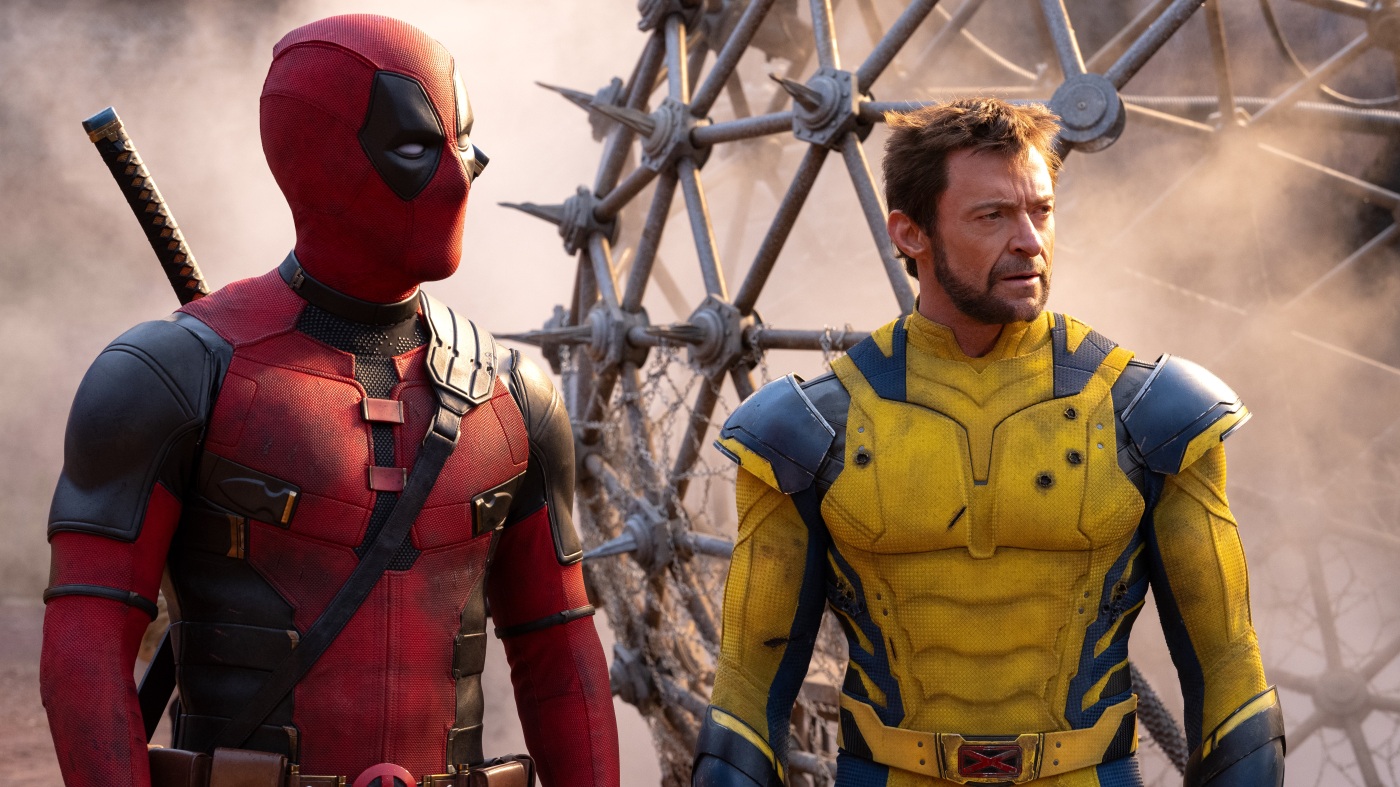Lifestyle
A Beijing restaurant critic arrives at a crossroads in this absorbing family drama

Gu (Xin Baiqing) struggles with his own sense of impermanence in The Shadowless Tower.
Strand Releasing
hide caption
toggle caption
Strand Releasing

Gu (Xin Baiqing) struggles with his own sense of impermanence in The Shadowless Tower.
Strand Releasing
The title of The Shadowless Tower refers to an enormous 13th-century Buddhist temple that looms over the Xicheng district of Beijing. It’s called the White Pagoda, and it was designed in such a way that its shadow can be hard to see.
That makes it a poignant metaphor for the movie’s middle-aged protagonist, Gu, who’s struggling with his own sense of impermanence. As he quietly drifts through a life riven by loss and disappointment, he wonders, as time slips away, if he himself will leave a meaningful impression.
The viewer, however, will not forget him anytime soon. Gu is played by the actor Xin Baiqing, whose movingly understated performance holds you through every step of this leisurely but absorbing drama.
We first meet Gu as he and his family are visiting the grave of his recently deceased mom. It takes a few moments to figure out how everyone’s related. The 6-year-old girl we see is Gu’s daughter, and she’s as happy and upbeat as her name, Smiley, would lead you to believe.
But we soon learn that Smiley lives with Gu’s older sister and brother-in-law, who have effectively adopted her. While Gu is very much a part of their lives, he’s an unreliable father at best, prone to showing up late — and sometimes drunk — for regular visits.
Whatever Gu’s failings as a parent, they seem to faintly echo those of his own father, whom he hasn’t seen since he was a young boy for reasons that are not immediately clear. Now, decades later, his long-absent father has been quietly reaching out to the family, and Gu is considering letting him back in.
You can imagine how this all might play out in a different movie, with stormy flashbacks, anguished recriminations and a tear-jerking happy ending. But the writer-director Zhang Lu is after something subtler and more realistic. He knows how hard it can be, in life, for even two willing parties to connect.
The movie’s other key relationship proves similarly elusive. Gu, who once dreamed of being a poet, now works as a restaurant critic. One of his colleagues is a mischievous young photographer named Ouyang, played by Huang Yao, who takes pictures of the dishes he writes about.
But while the two have a flirtatious chemistry, their romance never really gets off the ground. That may be because of their age difference, which Ouyang pokes fun at by playfully introducing Gu as her father or her boyfriend, depending on the situation. But it may also have something to do with Gu’s passivity. As another character puts it, “Too much politeness builds a wall between people.”
In its own unassuming way, The Shadowless Tower means to knock down some of those walls. Most of us realize, sooner or later, that we’re more like our parents or other family members than we care to admit. But the movie articulates that truth with a gentleness that can take your breath away, like the eerie moment when Gu realizes how much Smiley resembles the grandfather she’s never met.
And if this is a story of intergenerational conflict, we see some of that tension reflected in Beijing itself. The camera follows Gu around the city, where sleek modern surfaces coexist with ancient traditional buildings — like that White Pagoda, often seen in the background.
There’s another inspired touch that resonates powerfully if you know to look for it. Gu’s father is well played by the filmmaker Tian Zhuangzhuang, who, like many Chinese directors of his generation, experienced government censorship and persecution earlier in his career. His 1993 drama, The Blue Kite, set during the Great Leap Forward and the Cultural Revolution, was banned in mainland China, and Tian himself was restricted from filmmaking for 10 years.
I don’t think it’s a coincidence that Tian’s character in The Shadowless Tower is seen flying a kite, or that he’s shown to be emerging from exile. There’s sadness in that parallel, but also a sense of hope — a reminder that while none of us can change the past, the future remains beautifully unwritten.

Lifestyle
'Wait Wait' for July 27, 2024: With Not My Job guest Kathleen Hanna

Kathleen Hanna of The Julie Ruin performs onstage at the 2016 Panorama NYC Festival – Day 2 at Randall’s Island on July 23, 2016 in New York City. (Photo by Nicholas Hunt/Getty Images)
Nicholas Hunt/Getty Images/Getty Images North America
hide caption
toggle caption
Nicholas Hunt/Getty Images/Getty Images North America
This week’s show was recorded in Chicago with host Peter Sagal, judge and scorekeeper Bill Kurtis, Not My Job guest Kathleen Hanna and panelists Meredith Scardino, Peter Grosz, and Mo Rocca Click the audio link above to hear the whole show.
Who’s Bill This Time
Momala Takes Over; Assigned Seats Are Back; And The Heat Is On
The Olympic Torch Reporch
Our Summer Olympics Preview
Bluff The Listener
Our panelists tell three stories about someone committing an office faux pas, only one of which is true.
Not My Job: We quiz Bikini Kill’s Kathleen Hanna on Hanna-Barbera
Punk icon Kathleen Hanna plays our game called, “Kathleen Hanna Meet Hannah-Barbera.” Three questions about the animation studio.
Panel Questions
Hide Your Receipts; VR Meets ER; Avocado Apologies
Limericks
Bill Kurtis reads three news-related limericks: Situation Room Cocktails; Burrito Bird; Hopped Up Sharks
Lightning Fill In The Blank
All the news we couldn’t fit anywhere else
Predictions
Our panelists predict what will be the big story out of the Paris Olympic Games
Lifestyle
L.A. Affairs: At 77, I had a crush on my best friend’s widower. Did he feel the same way?

At 77, I had given up. After two failed marriages and years of unsuccessful dating, I accepted what seemed to be my fate: single for almost 40 years and single for however many remained. You don’t get it all, I told myself. I was grateful for family, friends and work. Life settled into what felt like order.
Until Ty.
As the husband of my best friend, he was no stranger, but he was usually peripheral. Then 10 years ago, my friend got lung cancer. I watched during visits, stunned at how nurturing Ty could be, taking care of her even though they had separated years before at her request.
After she died, Ty and I stayed in touch sporadically: a surprise sharing of his second granddaughter a year after we scattered my friend’s ashes, an invitation to the launch of my book a year later. Ty attended, hovering in the back, emerging after everyone left to attentively help load my car.
Two more years passed. During quiet moments, I remembered his sweetness. I also remembered his handsome face and long, tall body. Confused about what I wanted, I texted Ty, who’s an architect, under the guise of purchasing a tree for my backyard.
We spent an afternoon at the nursery, laughing, comparing options and agreeing on a final selection. When the tree arrived, I emailed a photo. He emailed a thank you.
Another three years passed, broken only by news of his third granddaughter and my memories of how good it felt to be with him. Alert to his attentiveness, but unsettled by both his remove and my growing interest, I risked reaching out again, this time about remodeling my garage.
Ty spent several hours at my house making measurements, checking the foundation and sharing pictures of his home in Topanga. His sketches for the garage arrived two weeks later via email.
I was grateful for his help but unsure over what sort of friendship we were developing, at least from his point of view. I, however, was clear. I wanted him to wrap his long arms around me, tell me sweet things and make me his.
Instead, I sent a gift card to a Topanga restaurant to thank him for his drawings.
“Maybe we should spend it together,” he texted.
We dined in the dusk of late summer. Our talk was easy. Discomfort lay in the unspoken. Anxious for clarity, I repeatedly let my hand linger near the candle flickering in the middle of our table. It remained untouched.
And that was as far as I was willing to go. I refused to be any more forward, having already compromised myself beyond my comfort level with what seemed, at least to me, embarrassingly transparent efforts to indicate my interest. Not making the first move was very important. If a man could not reach out, if he didn’t have the self-confidence to take the first step, he would not, I adamantly felt, be a good partner for me.
Two weeks later, Ty did email, suggesting an early evening hike in Tuna Canyon in Malibu. The setting was perfect. Sun sparkled off the ocean. A gentle breeze blew. We climbed uphill for sweeping coastal vistas and circled down to the shade of live oaks, touching only when he took my hand to steady me where the path was slippery. At the end of the trail, overlooking the juncture between the mountains and the sea, we stood opposite each other and talked animatedly for almost an hour, both of us reluctant to part.
Our conversation was engaging, but my inner dialogue was louder. When, I kept thinking, is this man going to suggest we continue the evening over dinner? We didn’t have to go out. We could eat at his house. It was 7 p.m., for God’s sake. Passing hikers even stopped to remark on our matching white hair and how well they thought we looked together. It was like a movie scene where the audience is yelling, “Kiss her, kiss her,” rooting for what they know is going to happen while the tension becomes almost unbearable. But bear it I did.
Each of us ate alone.
A few weeks later, at his suggestion, we were back at Tuna Canyon. This time Ty did invite me to end the evening at his house. Sitting close on his couch, but not too close, we drifted toward each other in the darkening room. His shoulder brushed mine reaching for his cup of coffee. My hip pressed his as I leaned in for my tea. Slowly, sharing wishes and hopes for our remaining years, we became shadows in the light of the moon. And in that darkness, in that illuminated space, he reached out.
This reticent man, this man who was so slow to move toward me, this sensitive man who hid himself behind layers so opaque I was unsure of his interest, released all that he had inside him.
“I wanted you,” Ty repeated again and again. “I was afraid of ruining things. You were her best friend. I didn’t want to lose your friendship.”
Our pent-up tension exploded.
Stunned and thrilled, I leaned into the space he opened.
Three years later, it is a space we continue to share: a place where neither of us has given up, a place where he wraps me in his long arms, a place we hold carefully against our diminishing days.
The author is the owner of a preschool in Venice as well as a psychotherapist, photographer and writer. Her first book, “Naked in the Woods: My Unexpected Years in a Hippie Commune,” was published in 2015. Her newest manuscript, “Bargains: A Coming of Aging Memoir Told in Tales,” is seeking a publisher. She lives in Mar Vista and can be found at margaretgrundstein.com, Instagram @margwla, Medium @margaretgrundstein and Substack @mgrundstein.
L.A. Affairs chronicles the search for romantic love in all its glorious expressions in the L.A. area, and we want to hear your true story. We pay $400 for a published essay. Email LAAffairs@latimes.com. You can find submission guidelines here. You can find past columns here.
Lifestyle
'Deadpool & Wolverine' is a self-cannibalizing slog

Ryan Reynolds stars as Deadpool and Hugh Jackman as Wolverine in an odd-couple action hero pairing.
Jay Maidment/20th Century Studios
hide caption
toggle caption
Jay Maidment/20th Century Studios
When Fox Studios released the first Deadpool movie back in 2016, it played like an irreverently funny antidote to our collective comic-book-movie fatigue. Wade Wilson, or Deadpool, was a foul-mouthed mercenary who obliterated his enemies and the fourth wall with the same gonzo energy.
Again and again, Deadpool turned to the camera and mocked the clichés of the superhero movie with such deadpan wit, you almost forgot you were watching a superhero movie. And Ryan Reynolds, Hollywood’s snarkiest leading man, might have been engineered in a lab to play this vulgar vigilante. I liked the movie well enough, though one was plenty; by the time Deadpool 2 rolled around in 2018, all that self-aware humor had started to seem awfully self-satisfied.
Now we have a third movie, Deadpool & Wolverine, which came about through some recent movie-industry machinations. When Disney bought Fox a few years ago, Deadpool, along with other mutant characters from the X-Men series, officially joined the franchise juggernaut known as the Marvel Cinematic Universe.
That puts the new movie in an almost interesting bind. It tries to poke fun at its tortured corporate parentage; one of the first things Deadpool says is “Marvel’s so stupid.” But now the movie also has to fit into the narrative parameters of the MCU. It tries to have it both ways: brand extension disguised as a satire of brand extension.

It’s also an odd-couple comedy, pairing Deadpool with the most famous of the X-Men: Logan, or Wolverine, the mutant with the unbreakable bones and the retractable metal claws, played as ever by a bulked-up Hugh Jackman.
The combo makes sense, and not just because both characters are Canadian. In earlier movies, Deadpool often made Wolverine the off-screen butt of his jokes. Both Deadpool and Wolverine are essentially immortal, their bodies capable of self-regenerating after being wounded. Both are tormented by past failures and are trying to redeem themselves. Onscreen, the two have a good, thorny chemistry, with Jackman’s brooding silences contrasting nicely with Reynolds’ mile-a-minute delivery.
I could tell you more about the story, but only at the risk of incurring the wrath of studio publicists who have asked critics not to discuss the plot or the movie’s many, many cameos. Let’s just say that the director Shawn Levy and his army of screenwriters bring the two leads together through various rifts in the multiverse. Yes, the multiverse, that ever-elastic comic-book conceit, with numerous Deadpools and Wolverines from various alternate realities popping up along the way.

I suppose it’s safe to mention that Matthew Macfadyen, lately of Succession, plays some kind of sinister multiverse bureaucrat, while Emma Corrin, of The Crown, plays a nasty villain in exile. It’s all thin, derivative stuff, and the script’s various wink-wink nods to other shows and movies, from Back to the Future to Furiosa to The Great British Bake Off, don’t make it feel much fresher. And Levy, who previously directed Reynolds in the sci-fi comedies Free Guy and The Adam Project, doesn’t have much feel for the splattery violence that is a staple of the Deadpool movies. There’s more tedium than excitement in the characters’ bone-crunching, crotch-stabbing killing sprees, complete with corn-syrupy geysers of blood.

For all its carnage, its strenuous meta-humor and an R-rated sensibility that tests the generally PG-13 confines of the MCU, Deadpool & Wolverine does strive for sincerity at times. Some of its cameos and plot turns are clearly designed to pay tribute to Fox’s X-Men films from the early 2000s.
As a longtime X-Men fan myself, I’m not entirely immune to the charms of this approach; there’s one casting choice, in particular, that made me smile, almost in spite of myself. It’s not enough to make the movie feel like less of a self-cannibalizing slog, though I suspect that many in the audience, who live for this kind of glib fan service, won’t mind. Say what you will about Marvel — I certainly have — but it isn’t nearly as stupid as Deadpool says it is.

-

 World1 week ago
World1 week agoOne dead after car crashes into restaurant in Paris
-

 Midwest1 week ago
Midwest1 week agoMichigan rep posts video response to Stephen Colbert's joke about his RNC speech: 'Touché'
-

 News1 week ago
News1 week agoVideo: Young Republicans on Why Their Party Isn’t Reaching Gen Z (And What They Can Do About It)
-

 Movie Reviews1 week ago
Movie Reviews1 week agoMovie Review: A new generation drives into the storm in rousing ‘Twisters’
-

 News1 week ago
News1 week agoIn Milwaukee, Black Voters Struggle to Find a Home With Either Party
-

 Politics1 week ago
Politics1 week agoFox News Politics: The Call is Coming from Inside the House
-

 News1 week ago
News1 week agoVideo: J.D. Vance Accepts Vice-Presidential Nomination
-

 World1 week ago
World1 week agoTrump to take RNC stage for first speech since assassination attempt
















